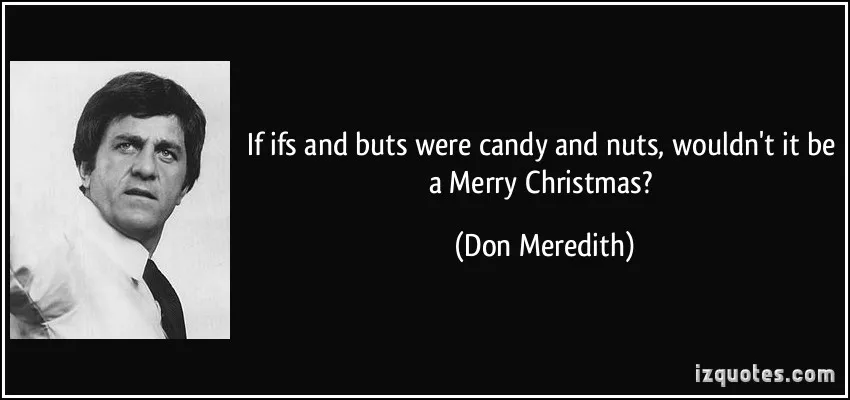no ifs, ands, or buts about it

Sometimes, dads like mine would give their 1970s broods strict instructions and finish with the warning, “No ifs, ands, or buts about it!”
In other words, no excuses would be deemed acceptable.
Do it or else.
Or don’t do that again.
Depends on the context.
I often received these instructions. Dad had them ready and on repeat for his opinionated, smart-mouthed firstborn. Whenever he invoked this addendum to an instruction, I knew that defying or failing to adhere would invoke dire consequences, which might include him sliding his leather belt from his pants. I know this is frowned on today. I am not here to debate the use of corporal punishment. I helped Dad break in that belt and kept it mostly off the asses of my younger siblings. I either wore him down or convinced him it was not the deterrent he thought it might be. Whatever. They should thank me, these siblings of mine, but they never have.
I had more “ifs” than Kipling, more “ands” than a legal document, and bigger “buts” than a Walmart checkout line. I also considered that line a potential sermon title, but it might rile a few prudes. Nobody wants that.
Holy Ifs, Ands, and Buts
If I had done so, I would have used the following Scripture passage for my text:
So, Solomon finished the Temple of the LORD, as well as the royal palace. He completed everything he had planned to do in the construction of the Temple and the palace. Then one night the LORD appeared to Solomon and said,
“I have heard your prayer and have chosen this Temple as the place for making sacrifices. At times I might shut up the heavens so that no rain falls, or command grasshoppers to devour your crops, or send plagues among you. Then if my people who are called by my name will humble themselves and pray and seek my face and turn from their wicked ways, I will hear from heaven and will forgive their sins and restore their land. My eyes will be open and my ears attentive to every prayer made in this place. For I have chosen this Temple and set it apart to be holy—a place where my name will be honored forever. I will always watch over it, for it is dear to my heart.
“As for you, if you faithfully follow me as David your father did, obeying all my commands, decrees, and regulations, then I will establish the throne of your dynasty. For I made this covenant with your father, David, when I said, ‘One of your descendants will always rule over Israel.’
“But if you or your descendants abandon me and disobey the decrees and commands I have given you, and if you serve and worship other gods, then I will uproot the people from this land that I have given them. I will reject this Temple that I have made holy to honor my name. I will make it an object of mockery and ridicule among the nations. And though this Temple is impressive now, all who pass by will be appalled. They will ask, ‘Why did the LORD do such terrible things to this land and to this Temple?’
“And the answer will be, ‘Because his people abandoned the LORD, the God of their ancestors, who brought them out of Egypt, and they worshiped other gods instead and bowed down to them. That is why he has brought all these disasters on them.’”
2 Chronicles 7:11–22
God had some ifs, ands, and buts for Solomon and Israel, and He was not taking any ifs, ands, or buts in return.
We can summarize His instructions thus:
Here is a path. Follow it to fulfillment and blessing. Abandon it at your peril. Either way, your future is yours to design.
Harvesting your ifs, ands, and buts.
God has woven the immutable principles of sowing and reaping into the fabric of Creation.
Under the segment heading, We Harvest What We Plant, the New Living Translation of the Holy Bible renders the following passage from the Apostle Paul to the churches of Galatia:
Dear brothers and sisters, if another believer is overcome by some sin, you who are godly should gently and humbly help that person back onto the right path. And be careful not to fall into the same temptation yourself. Share each other’s burdens, and in this way obey the law of Christ. If you think you are too important to help someone, you are only fooling yourself. You are not that important.
Pay careful attention to your own work, for then you will get the satisfaction of a job well done, and you won’t need to compare yourself to anyone else. For we are each responsible for our own conduct.
Those who are taught the word of God should provide for their teachers, sharing all good things with them.
Don’t be misled—you cannot mock the justice of God. You will always harvest what you plant. Those who live only to satisfy their own sinful nature will harvest decay and death from that sinful nature. But those who live to please the Spirit will harvest everlasting life from the Spirit. So let’s not get tired of doing what is good. At just the right time we will reap a harvest of blessing if we don’t give up. Therefore, whenever we have the opportunity, we should do good to everyone—especially to those in the family of faith.
Galatians 6:1–10

The immutable law of sowing and reaping
Many years ago, I heard a preacher give the best outline I have ever found for the law of sowing & reaping:
#1: You reap what you sow.
You sow corn, you reap corn. Sow onions, reap onions. Etc.
#2: You reap after you sow.
Planting season and harvest are separated by days, weeks, or months. In life, they may be separated by years or even decades. But the harvest will come. God designed it so.
#3: You reap more than you sow.
In Evangelist Chuck Milhuff’s signature sermon, Giving Living, he pointed out that a farmer plants a few kernels of corn. From one of those kernels, a stalk will grow. On that stalk, several cobs will grow. On each cob, there will be rows and rows of kernels.
I decided to Google how many kernels of corn are on a typical corn cob. The answer? Between 500 and 1200 kernels! Most stalks contain one to two cobs. So, as many as 2,400 kernels will result from a single planted kernel of corn!
This is how the law of sowing and reaping works.
No ifs, ands, or buts about it
Do not rush past my use of the word “immutable.” It is important.
What does “immutable” mean? Well, you know what it means to “Mute” something. It means you put it on silent so you can ignore it. You, therefore, hope to mitigate its impact on you.
Immutable means “not capable of or susceptible to change.”
The law of sowing and reaping is immutable. You can ignore it. You can deny it. You cannot avoid it. You cannot change it.
What we do today will bring a harvest in time and echo in eternity. We are always busy sowing and reaping. While we sow today’s seed, we reap yesterday’s harvest.
This puts a premium on every decision, every word, every deed.
Believe me. I speak from experience, and not all of it (or much of it) is good. Even as I write this, I am reaping and sowing. Some of the harvest is bitter. Much of it is blessed. What will I sow today?
Ignore the law of sowing and reaping at your peril.
No ifs, ands, or buts about it.
Want to support Gene’s work, or say thanks in some tangible way?
Join as a paid subscriber and enjoy exclusive perks—including free signed copies of Gene’s upcoming books! Or, if you’d like to show your appreciation in a simple way, just hit the button to buy Gene a coffee as a one-time gesture of support.

